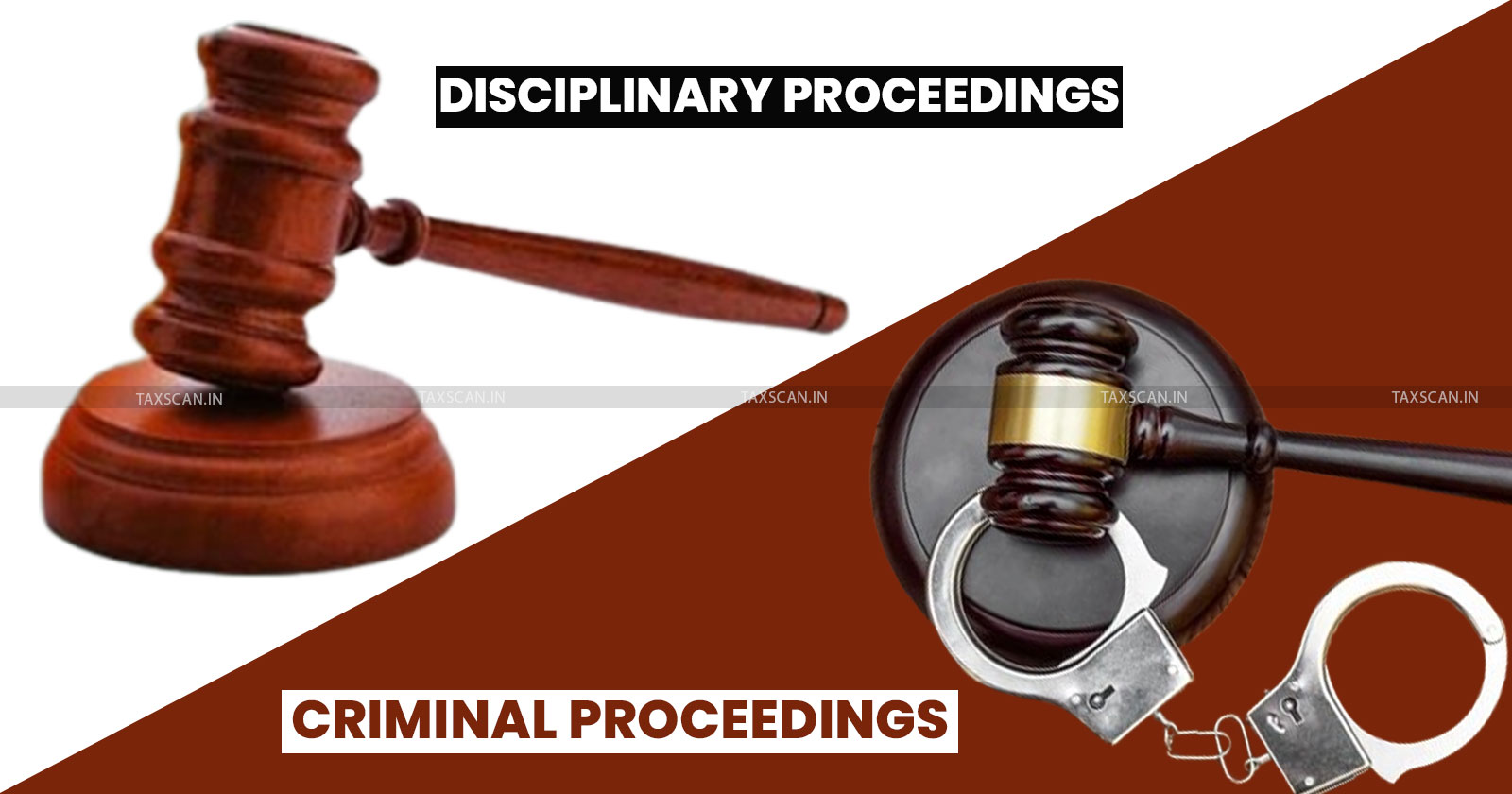Disciplinary Proceedings are distinct from Criminal Proceedings and operate on different standard of Proof: ICAI
“ln Departmental proceedings, factors prevailing in the mind of the Disciplinary authority may be many, such as enforcement of discipline of to investigate level of integrity of delinquent or other staff. The standard of proof required in those proceedings is also different from that required in a criminal case.” - Supreme Court

ICAI – Institute of Chartered Accountants of India – Disciplinary Proceedings vs. Criminal Proceedings – ICAI Standards of Proof – Taxscan
ICAI – Institute of Chartered Accountants of India – Disciplinary Proceedings vs. Criminal Proceedings – ICAI Standards of Proof – Taxscan
The Board of Discipline of Institute of Chartered Accountants of India ( ICAI ) clarified that the disciplinary proceedings are distinct from criminal proceedings and operate on a different standard of proof.
The board was dealing with a case where the respondent-CA’s irregularities came out through a newspaper article published by the Time of India titled “CA with 15 high-end properties arrested”.
The Directorate General of Central Excise Intelligence ( DGCEI ) initiated action against the Respondent- CA due to the possession of substantial real estate assets in affluent areas of Delhi, Haryana, Canada, and Tanzania, without justifiable income sources. The report suggested that the Respondent's approach included setting up companies, acquiring properties under their names, and subsequently claiming financial instability for these companies.
The Chartered Accountant respondent, amidst several irregularities, persisted in the role of Managing Director without obtaining the requisite approval from the ICAI, constituting a serious breach of ethical standards.
The respondent-CA submitted that the criminal case is currently in the pre-charge evidence stage, and no charges have been filed against them by the learned court. Additionally, the Writ Petition, seeking the quashing of the criminal complaint, is still pending before the MP High Court at Indore Bench.
The respondent mentioned that their statement, as per paragraph 7.4 of the paper book, was obtained under coercion, and they have filed a retraction in court. They requested the board to suspend the case until the court makes a decision.
Regarding the charge, the Board acknowledged the Respondent's request to suspend the proceedings until the High Court of Indore's decision. However, the Board clarified that disciplinary proceedings differ from criminal proceedings.
While criminal cases required proof beyond a reasonable doubt, disciplinary proceedings rely on a preponderance of probabilities to establish misconduct. This distinction was highlighted by a ruling from the Supreme Court in the case of Ajit Kumar Nag vs. General Manager (PJ) Indian Oil Corporation Limited-AIR 2005 SC 4217. The Supreme Court observed as follows :
“The degree of proof which is necessary to order a conviction is different from the degree of proof necessary to record the commission of delinquency. The rules relating to appreciation of evidence in the two proceedings is also not similar. In criminal law, burden of proof is on the prosecution and unless the prosecution is able to prove the guilt of the accused 'beyond reasonable doubt he cannot be convicted by a Court of law. In a departmental enquiry penalty can be imposed on the delinquent Officer on a finding recorded on the basis of 'preponderance of probability.”
Similarly in the matter of Capt. M Paul Anthony —vs- Bharat Gold Mines Limited - AIR... , 1999 SC 1416 the Hon'ble Supreme Court held as under:-
“ln Departmental proceedings, factors prevailing in the mind of the Disciplinary authority may be many, such as enforcement of discipline of to investigate level of integrity of delinquent or other staff. The standard of proof required in those proceedings is also different from that required in a criminal case. While in Departmental proceedings, the standard of proof is one of preponderance 01 probabilities, in a criminal case, the Charge has to be proved by the prosecution beyond reasonable doubt."
Thus, the Disciplinary Board viewed that the plea raised by the Respondent that the extant case is pending before Court of Competent jurisdiction and the instant disciplinary proceedings be kept in abeyance till the completion of the same cannot sustain.
The issue that is to be examined by the Board is whether the conduct of the Respondent arising out of the circumstances as stated in the case records has brought disrepute to the profession and thus, amounting to Other Misconduct' as provided under the Chartered Accountants Act 1949.
To Read the full text of the Order CLICK HERE
Support our journalism by subscribing to Taxscan premium. Follow us on Telegram for quick updates


